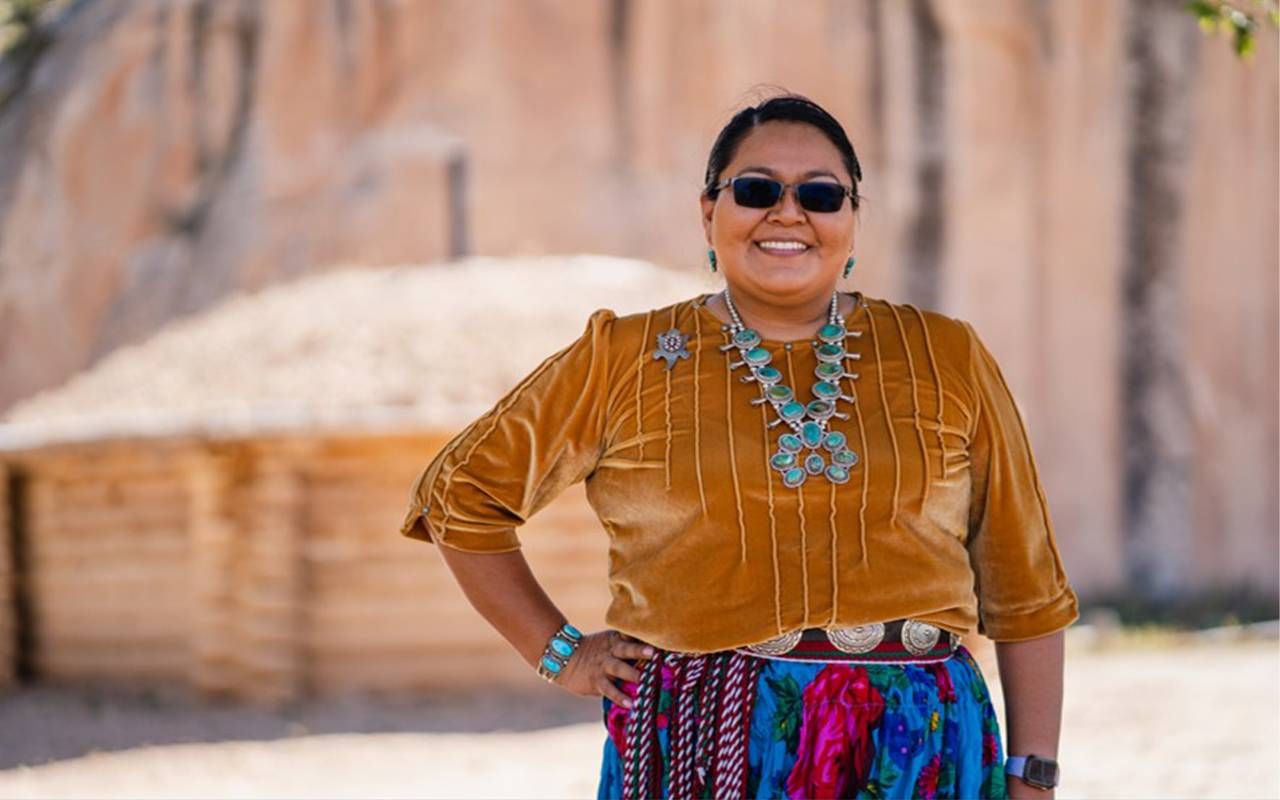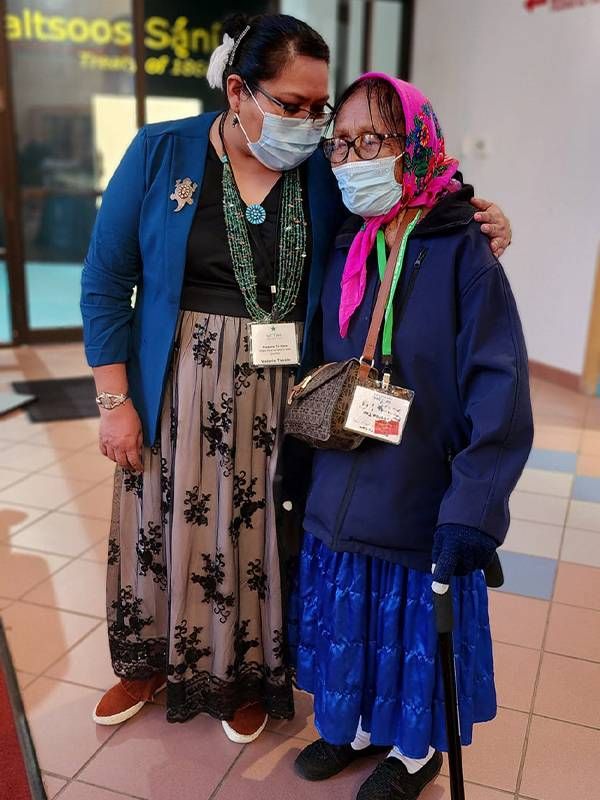Supporting Navajo Caregivers: A Call to Action

The trailblazing journey of a member of the Navajo Nation to support caregivers emotionally and financially.
Supporting Navajo Caregivers: A Call to Action
The trailblazing journey of a member of the Navajo Nation to support caregivers emotionally and financially
By Emily Wilson|February 10, 2023|CaregivingSHARE
https://www.nextavenue.org/sup...
Valerie Tsosie, a member of the Navajo Nation, started the So'Tsoh Foundation (meaning big or North star in the Diné language) in August of 2020, offering resources and training to support Diné caregivers. The organization "utilizes an integrated Diné approach that takes into consideration the body, mind and spirit connection."

Tsosie had been working as a caregiver resource specialist with the Navajo Nation Division of Aging and Long-Term Care Support, so she knew what caregivers needed. So when her program shut down due to the COVID-19 pandemic, Tsosie felt she needed to do something so caregivers and people who depended on them could still get help.
The Navajo Nation, the biggest reservation in the country, is spread over 27,000 square miles.
"I was like, COVID is not going to stop cancer. It's not going to stop dementia. Life goes on, and there's still things you need to do," she said. "I thought, 'you know what, I can do it myself!' So that's why the foundation started — to keep these services going."
The Navajo Nation, the biggest reservation in the country, is spread over 27,000 square miles. People often go long distances to get services or to see a doctor.
Tsosie lives in the capital, Window Rock, Arizona, with a school, grocery store and hospital. Many people need to have health care services readily available: there is also no memory care center.
With the training she does, Tsosie wants to bring information to caregivers who often can't get it anywhere else. So she makes sure to cover health and safety issues.
"I thought when the hospital gives you a wheelchair, they show you how to use it and carefully lift your person without hurting yourself or that person," Tsosie said. "No, they didn't do any of that."

She also ensures the training is culturally relevant after seeing that sometimes people bringing outside resources don't know how to talk with caregivers in the Navajo Nation about sensitive topics such as cancer and Alzheimer's.
"They [the presenters] are speaking English, and people understand English, but it might as well be German," she said. "The concept and the approach are not relevant to the community."
People are interested in learning about dementia and Alzheimer's, and dozens show up for those trainings, Tsosie said.
At the end of almost all of these sessions, people ask how they can tell the difference between dementia and Alzheimer's, tell Tsosie how scared they are that the person they are taking care of has those illnesses, and ask for guidance.
"Training has to take into account people's culture," she adds. "The brain is a sacred topic. We would say, 'we can't do it that way.' Let's brainstorm on how we're going to make this better."
Because of the demand, the foundation did training for all five of the agencies in the Navajo Nation, emphasizing things like early detection, risk factors, and current research and treatments. The organization also put on health fairs, seeing them as avenues to let older adults and caregivers know about what is happening, especially after COVID.
"Everything was so locked down, and we're finally opening back up," Tsosie said. "We need to let our community know, 'hey, this resource reopened, and here's what can you get from them.'"
How Education Helped
Josie Long is a Phoenix, Arizona, caregiver who has benefitted from the So'Tsoh Foundation. Long cared for a mother with dementia that became Alzheimer's (her mom passed away in September). Long says she was grateful to learn more about how the diseases affected her mother and what she could do about it.
"Their brain does not work like our brain, and they're repeating things and you're learning how to be patient with them and to treat them with respect," she said. "I learned not to treat them like a little kid, but treat them like an adult."
Long also got to know Tsosie. They would email and talk and, when they could, get together in Phoenix, where Long lives, or meet at the Navajo Nation Museum in Window Rock, Arizona.
Long heard about the foundation and connected with Tsosie through Facebook. She says being supported by other caregivers makes a big difference – and she sees the power of working with others to try and improve life for caregivers and the people they work with.
The Work of Caregivers
There are 2.2 million domestic workers — including nannies, housecleaners, and care workers, says Haeyoung Yoon, the senior policy director for the National Domestic Workers Alliance (NDWA). The labor of these workers keeps hundreds of thousands of households going.
"The pandemic underscored how broken our care system is."
Yoon says the situation in the Navajo Nation, with resources challenging to access, highlights the need for more protection for caregivers. "The pandemic underscored how broken our care system is," Yoon said.
"We have been working on various fronts to put a spotlight on the value of care work, who care workers are, how important it is for them to have protections, and the importance of raising standards in the workplace."
Yoon says that most caregivers are now covered under minimum wage and overtime laws. But domestic and agricultural workers were excluded from the National Labor Relations Act in the 1930s.
As a result, much of the workforce is still banned from some health and safety protections, including federal anti-harassment and anti-discrimination protections.
The NDWA, now 15 years old, has been fighting to pass a Domestic Workers Bill of Rights, a federal bill that would improve working conditions for domestic workers, including paid time off and anti-discrimination protections. A Bill of Rights would not just rightfully classify care work as valued work worthy of protection – it would recognize caregivers' distinctive policy needs across state borders.
"This is for people with disabilities and aging adults," Yoon said. "There's an enormous caregiving need, and this is a workforce that's earning low wages, is in isolation, and doesn't have enough protections."
Yoon points out that this workforce, where people earn $12 an hour, is overwhelmingly women — about 90%. "Many of them are women of color, and a significant amount, probably a third, are immigrant workers," she said. "So, it's no surprise that this is a workforce whose work is devalued."
Support for Caregivers is Essential
Yoon and those at the NDWA would like caregivers to be seen as what they are — essential. Yoon says they are part of the infrastructure of society and as vital as roads and bridges.
Home care workers desperately need a livable wage, Long said. "We can't live on $12. I'm grateful that my husband works. If it wasn't for my husband, I'd be out on the streets."
Like many caregivers, Long found it extremely difficult to get away and felt isolated taking care of her mother with almost no breaks, except when her adult daughter, who has children of her own, could relieve her.
When she felt close to a breakdown, she called her case manager, asking for someone to relieve her, but the case manager didn't get back to her, so getting to spend time with Tsosie, who understood her situation and tried to help, meant a lot to her.
People don't understand caregiving until it "hits them in the face," so they don't know how precarious and underpaid it is.
Tsosie encourages people like Long to tell their stories, which she thinks can help humanize this workforce. This is especially true in the Navajo Nation, where she says that sometimes indigenous people aren't seen as having the same needs and concerns as others.
"A lot of times if people don't know a Native community, I feel like they think that Natives are wearing loincloths and living under bushes," Tsosie said.
Further, she added that people are confusing a lack of resources and infrastructure with not knowing what's happening worldwide. She also thinks that people don't understand caregiving until it "hits them in the face," as she puts it, so they don't know how precarious and underpaid it is.
Tsosie said, "The pandemic should have been a real eye opener for the health field. Well, guess what? Caregivers are part of the health field, and we need to be supporting our caregivers and compensating them."
"Because of these injustices, we're working together with the Domestic Workers Alliance and our other partners to highlight these issues for caregivers because this is going to get worse," she said of the Navajo Nation.
SHARE Emily Wilson lives in San Francisco. She writes for a number of outlets including Smithsonian.com, Daily Beast, 48 Hills, Hyperallergic, Latino USA, Women’s Media Center, California Magazine, and San Francisco Classical Voice. For years she taught adults getting their high school diplomas at City College of San Francisco. Read More
Categories: : press release
https://kjzz.org/content/1836341/organization-aims-support-native-american-dementia-caregivers-navajo-nation Valerie Tsosie
Valerie Tsosie 